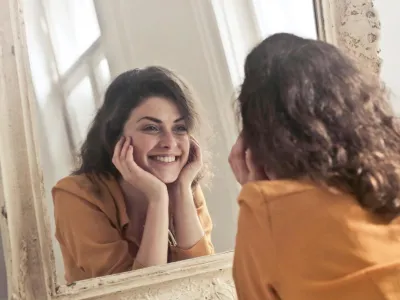
Exploring The Dangers Of Idealised Masculinity
Writers’ Club member Eve is here with a blog exploring the ideas of masculinity and what perpetuating beauty standards mean for men. Here’s what they have to say...
Men are taught to be masculine, strong and to uphold the image of “the perfect man”. Why?
What is the perfect man? Is he tanned with muscles? Is he blonde with blue eyes? Does he act rowdy, superior or dominant? Actually, he is all or none of these characteristics. He could be tall, short, big or small. He could have blue, brown, green, grey or any colour eyes. He could have scars or he could not. The point is, there is no “perfect” man. There is no “average” male. There is no one male image that young men should strive for, because perfection doesn’t exist.

Not only does this cause issues with self-esteem and make men self-conscious, but it also affects their mental health. Millions of men worldwide struggle with body image that the vast majority won’t talk about, that can lead to long term mental health problems. In a recent survey, 55% of boys said they would consider changing their diet to get in shape, with 23% saying they believed the image of “the perfect man” exists. Some of the main pressures to look in shape included coming from friends, social media, advertisements and celebrities. With men such as Freddie Flintoff and James Corden speaking out about body image in recent years, there is some hope for future generations to see themselves in a positive light when it comes to their physical appearance. But with these figures and pressures, societal changes are needed to prevent long term-damage to our youth and male counterparts.
Advertisements are guilty of warping our perception of image, with many young men believing they need to look the same as the men in adverts. Adverts from designers and brands such as Paco Rabanne and Armani, depict men as models or even gods to sell products. However, the use of editing, angles and excellent cinematography, make the men in these adverts seem “perfect” and are used to draw people into both the advert and the product. So why is there so little representation of the everyday man in advertisements and in the media?

The lack of men in the media who haven’t had make-up applied to their face to make them look vibrant and alive, or who haven’t been airbrushed post-shoot, is shocking and increasingly damaging to young men, as it causes often irreparable damage when it comes to the way they perceive their own bodies.
Men should be proud and supportive of each other’s bodies, whatever shape and size they are. Image should be seen as an extension of a person’s personality and character, not the first detail you should judge upon meeting them. Yes, media coverage should be diversified and representative, but issues like body positivity need to be solved by starting small, with individual people and then spreading to all corners of society.
By forming ideas to combat idealised masculinity in all walks of life, from film to the workplace, pubs to schools, we can reduce and ultimately end male heartache when it comes to body image, size, hape and weight. By depicting men in everyday settings with no editing or make-up, no fancy lighting or finely tuned angles, the warped view that currently surrounds the male population will soon start to clear and they can move to the crucial stage of body positivity: acceptance. Once acceptance has been achieved (and it is truly a gruelling stage to fight your way through, and is extremely difficult when your self-esteem has been reduced to an atom), positivity and expression will flourish.
Male and female body image issues will always persist, even in the best of times and in the smallest capacities, but if we combat idealised ideas of masculinity together, we can stop the increase in the disproportionate number of young (and old) men suffering due to bodies that they can’t change.
If we all lived the same, we would all still look different. So why are we judging each other?





